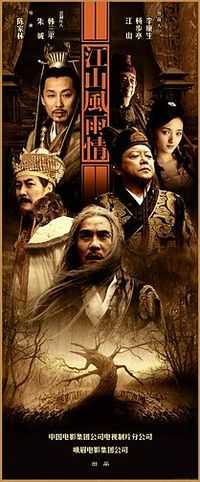Jiangshan Fengyu Qing
| Jiangshan Fengyu Qing | |
|---|---|
 DVD cover art | |
| Also known as | Love Against Kingship |
| Genre | Historical drama, romance |
| Written by | Zhu Sujin |
| Directed by |
Chen Jialin He Xianda |
| Presented by |
Li Kangsheng Luo Shan Yang Buting |
| Starring |
Wang Gang Tang Guoqiang Chen Daoming Li Qiang Zhang Lanlan Ding Haifeng Liu Wei Chen Baoguo |
| Opening theme | Ping'an Meng (平安梦) performed by Han Lei |
| Ending theme | Bianshui Liu (汴水流) performed by Han Lei and Liu Jin |
| Country of origin | China |
| Original language(s) | Mandarin |
| No. of episodes | 45 |
| Production | |
| Executive producer(s) | Jiang Xiaoqun |
| Producer(s) |
Han Sanping Zhu Cheng |
| Location(s) | China |
| Cinematography | Su Li |
| Running time | 45 minutes per episode |
| Broadcast | |
| Original channel | CCTV |
| First shown in | 2003 |
| Jiangshan Fengyu Qing | |||||||
| Simplified Chinese | 江山风雨情 | ||||||
|---|---|---|---|---|---|---|---|
| Traditional Chinese | 江山風雨情 | ||||||
| |||||||
Jiangshan Fengyu Qing is a 2003 Chinese television series based on the novel of the same Chinese title by Zhu Sujin, who was also the screenwriter for the series. The series depicts the events in the transition of the Ming Dynasty to the Qing Dynasty in China, focusing on the lives of historical figures such as Li Zicheng, Wu Sangui, Chen Yuanyuan, the Chongzhen Emperor and Hong Taiji.
Plot
In 1627, the young Chongzhen Emperor succeeds his brother, the Tianqi Emperor, as the ruler of the Ming Dynasty, with help from the eunuch Wang Cheng'en. The hardworking Chongzhen strives to save the dwindling Ming Empire from collapse and seeks to restore it to its former glory. However, the government has been plagued by corruption since his predecessors' time, and the common people have rebelled against him under the leadership of Li Zicheng. Besides, on the northern frontier, Hong Taiji, the ambitious warrior-king of the Manchu-led Qing Dynasty, is actively preparing his armies for an invasion of Ming China.
Yuan Chonghuan and Hong Chengchou are both capable military leaders appointed by Chongzhen to counter the Manchu invaders, but they meet with different fates — Yuan is executed by slow slicing for treason after Chongzhen believes false accusations that Yuan is plotting against him; Hong is forced to surrender to the Manchus after his defeat at the Battle of Songjin, and he aids the Qing forces on their campaign against the Southern Ming Dynasty later.
In 1644, the Ming capital Beijing falls to Li Zicheng's rebel army, and Chongzhen commits suicide by hanging himself on a tree. Shortly after, Wu Sangui, a Ming general defending the border, defects to the Qing Dynasty and opens Shanhai Pass, allowing Qing forces to enter and overrun the rest of Ming China. The cause of Wu's defection is attributed to his beloved concubine Chen Yuanyuan, a legendary beauty. Chen was initially held hostage in Beijing to prevent Wu from betraying the Ming Empire. She was later seized by Liu Zongmin, one of Li Zicheng's generals, when the rebels captured the capital. In anger, Wu agreed to side with the Manchus to deal with the rebels.
Cast
- Wang Gang as Wang Cheng'en
- Li Qiang as Chongzhen Emperor
- Ding Haifeng as Wu Sangui
- Liu Wei as Li Zicheng
- Zhang Lanlan as Chen Yuanyuan
- Tang Guoqiang as Hong Taiji
- Chen Daoming as Tianqi Emperor
- Chen Baoguo as Yongli Emperor
- Bao Guo'an as Hong Chengchou
- Wang Huichun as Fan Renkuan
- Zhou Jie as Hou Chaozong
- Li Zhi as Dorgon / Dodo
- Yan Kun as Shunzhi Emperor
- Deng Chao as Kangxi Emperor
- Xu Min as Longwu Emperor
- Li Ding as Wei Zhongxian
- He Xianda as Koxinga
- Niu Li as Consort Zhuang
- Wang Minghu as Hooge
- Zhang Xiaozhong as Yuan Chonghuan
- Li Jianqun as Empress Zhou
- Liu Jun as Huang Yu
- Ma Jie as Lu Si
- Zhang Qiuge as Liu Zongmin
- Liu Yubin as Zhou Yanru
- Wang Jinghua as concubine
- Zeng Jing as Eunuch Li
- Liu Peiqing as Gao Yingxiang
List of featured songs
- Ping'an Meng (平安梦; Dream of Peace) performed by Han Lei
- Bianshui Liu (汴水流; The Bian River Flows) performed by Han Lei and Liu Jin
- Dian Jiangchun Guiqing (点绛唇·闺情; Red Lips, Woman's Love) performed by Liu Jin
- Biyuntian (碧云天; Jade Cloud Sky) performed by Liu Jin
External links
- (Chinese) Jiangshan Fengyu Qing on Sina.com
- (Chinese) Jiangshan Fengyu Qing on xinhuanet.com